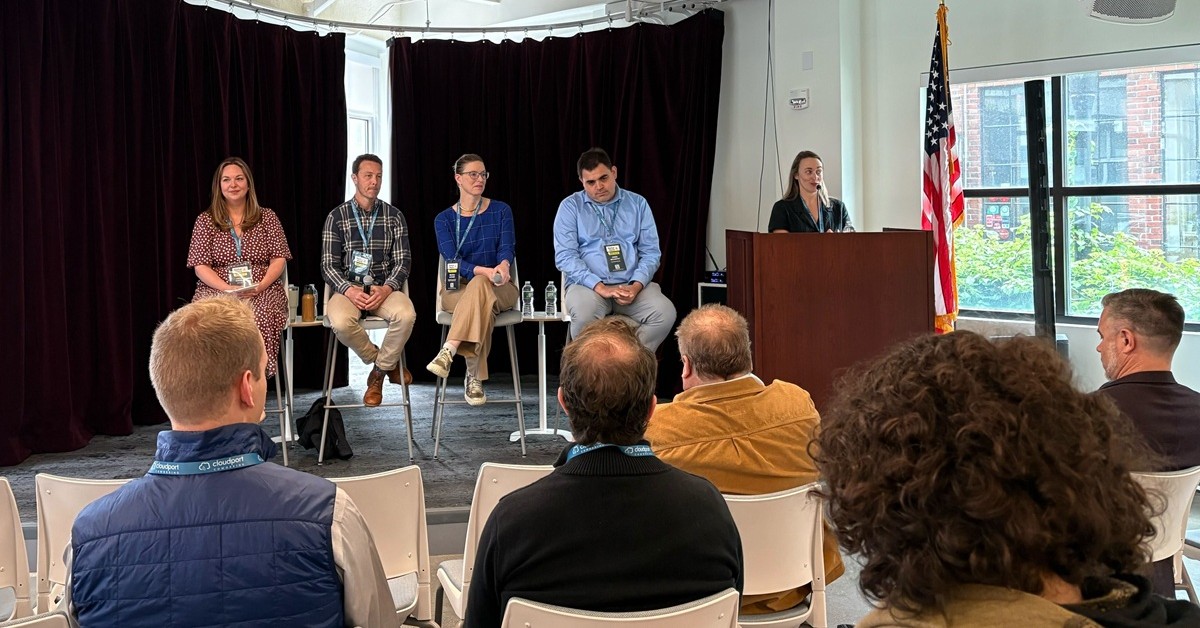What Marketers Can Learn from Startup Maine: Insights from the Ecosystem

By Lydia Chadwick, Account Manager & Marketing Consultant
Startup events aren’t just for founders. As a marketer working with growth-stage startups and scale-ups, I recently attended Startup Maine to learn more about how today’s innovators think, collaborate, and make decisions. These insights directly inform how we help startups and scaling businesses tell their stories, build demand, and grow.
I walked away from the event energized—not only by the innovation and grit, but by how many of the conversations connected back to good marketing fundamentals. Here’s what stood out to me (and why it matters from a marketing perspective).
Startup Energy for Your Brand
The energy at Startup Maine was undeniable. Founders, ecosystem players like accelerators, investors, and lawyers, and even the “startup curious” showed up with a shared sense of momentum and creative drive. There is something so powerful about being in a room full of people who are solving problems in real-time.
You don’t need to be in “startup mode” to channel that energy into your marketing. What matters for businesses at all growth stages is honing your messaging to reflect who you are and where you’re going with clarity.
For some companies, that means leaning into bold, visionary language. For others, it’s about grounded expertise, clarity, and trust. The key is being intentional about how you show up through your tone, positioning, visuals, and storytelling and making sure your brand reflects the way you solve problems and deliver value.
Startups are forced to define and differentiate early. But any business, at any stage, benefits from stepping back and making sure the outside matches the inside.
(Read more insights and inspiration on this topic on our blog, Inside Startup Marketing: Advice from Leading CEOs)
A Founder’s Lesson in Humility and Initiative
One of the most memorable quotes I heard came from Melissa LaCasse, CEO of Tanbark, during a session on startup journeys in Maine. Reflecting on her early days, she shared that she was “very comfortable picking up the phone and sounding like an idiot” in order to learn how the ecosystem worked and what resources were available to her.
This is a mindset that all of us can benefit from, not just startups. The willingness to ask questions, the risk of looking uninformed, and diving into the unknown is something marketers can (and should) embrace. Whether we’re stepping into a new industry, trying to deeply understand a target audience, or vetting a new platform or approach, curiosity and humility are key. This approach pays off—people are often helpful and willing to educate.
Strategic Partners Make the Difference
A recurring theme throughout the event was the importance of choosing the right advisors and partners. Startups often move quickly and lean heavily on outside expertise, and the quality of those relationships can either accelerate progress or create costly detours.
At Magnetude, we see this all the time. From the marketing side, successful partnerships that drive results are built on alignment, trust, and clear communication. But it goes beyond just marketing. Whether it’s product development, legal, sales, or operations, startups thrive when they surround themselves with partners who get their goals and roll up their sleeves accordingly.
Community Isn’t Optional—Even for Remote Businesses
Community plays a central role in the startup space. Every day at Startup Maine kicked off with a coffee meetup designed for different segments of attendees, and conversations throughout the event—both in and out of sessions—frequently circled back to the importance of local groups, peer support, and ecosystem resources. Even (or maybe especially) for remote and hybrid companies, there’s real value in connecting with others who understand your world.
That same principle applies to marketing. Building a strong brand isn’t just about outbound tactics—it’s about creating and nurturing the right micro-communities. Whether that’s through content, partnerships, peer groups, or customer engagement programs, the ability to foster connection at a smaller scale often leads to greater loyalty and long-term growth. For growth-stage startups, particularly those operating in niche markets or with distributed teams, this kind of community strategy can be a key differentiator.
AI Responsibility Is a Marketing (and Business) Issue
One of the standout sessions of the day was “Responsible AI: Balancing Innovation and Accountability.” It’s no secret that AI is reshaping how we work, and that includes marketing. What’s often missing from the conversation is how to evaluate and adopt AI tools in a way that enhances performance without compromising ethics, transparency, brand integrity, or the human side that makes long-term success possible.
At Magnetude, we’re actively using AI across our work—from content workflows to data analysis to campaign optimization—while staying grounded in strategy and human insight. We approach AI as a tool to elevate what our team delivers, not as a shortcut that replaces thoughtful marketing. If you’re curious, we share more on this in our feature on AI in B2B Marketing.
For founders and marketers alike, now is the time to get intentional about how AI shows up in your business—and your brand.
Final Thoughts: Why Ecosystem Events Matter
This was my first time attending Startup Maine, but it won’t be my last. Events like this are an opportunity to learn, but they also create space for reflection, connection, and market insight outside of the concrete topics of the event. As a marketer, there’s real value in hearing your audience think out loud, seeing what excites them, and understanding the challenges they’re trying to solve. These insights shape better messaging, more relevant strategies, and stronger go-to-market execution.
At Magnetude Consulting, we help startups and growth-stage B2B companies translate insight into strategy. Learn more about our startup marketing capabilities or get in touch to learn more.